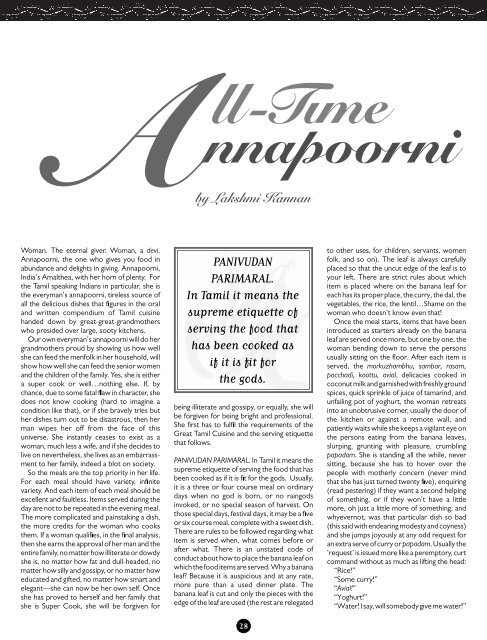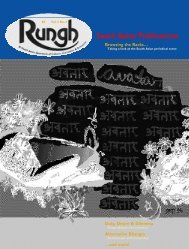You also want an ePaper? Increase the reach of your titles
YUMPU automatically turns print PDFs into web optimized ePapers that Google loves.
Aby<br />
Lakshmi Kannan<br />
Woman. <strong>The</strong> eternal giver. Woman, a devi.<br />
Annapoorni, the one who gives you food in<br />
abundance and delights in giving. Annapoorni,<br />
India’s Amalthea, with her horn of plenty. For<br />
the Tamil speaking Indians in particular, she is<br />
the everyman’s annapoorni, tireless source of<br />
all the delicious dishes that figures in the oral<br />
and written compendium of Tamil cuisine<br />
handed down by great-great-grandmothers<br />
who presided over large, sooty kitchens.<br />
Our own everyman’s annapoorni will do her<br />
grandmothers proud by showing us how well<br />
she can feed the menfolk in her household, will<br />
show how well she can feed the senior women<br />
and the children of the family. Yes, she is either<br />
a super cook or well…nothing else. If, by<br />
chance, due to some fatal flaw in character, she<br />
does not know cooking (hard to imagine a<br />
condition like that), or if she bravely tries but<br />
her dishes turn out to be disastrous, then her<br />
man wipes her off from the face of this<br />
universe. She instantly ceases to exist as a<br />
woman, much less a wife, and if she decides to<br />
live on nevertheless, she lives as an embarrassment<br />
to her family, indeed a blot on society.<br />
So the meals are the top priority in her life.<br />
For each meal should have variety, infinite<br />
variety. And each item of each meal should be<br />
excellent and faultless. Items served during the<br />
day are not to be repeated in the evening meal.<br />
<strong>The</strong> more complicated and painstaking a dish,<br />
the more credits for the woman who cooks<br />
them. If a woman qualifies, in the final analysis,<br />
then she earns the approval of her man and the<br />
entire family, no matter how illiterate or dowdy<br />
she is, no matter how fat and dull-headed, no<br />
matter how silly and gossipy, or no matter how<br />
educated and gifted, no matter how smart and<br />
elegant—she can now be her own self. Once<br />
she has proved to herself and her family that<br />
she is Super Cook, she will be forgiven for<br />
ll-Tıme<br />
nnapoorni<br />
PANIVUDAN<br />
PARIMARAL.<br />
In Tamil it means the<br />
supreme etiquette of<br />
serving the food that<br />
has been cooked as<br />
if it is fit for<br />
the gods.<br />
being illiterate and gossipy, or equally, she will<br />
be forgiven for being bright and professional.<br />
She first has to fulfil the requirements of the<br />
Great Tamil Cuisine and the serving etiquette<br />
that follows.<br />
PANIVUDAN PARIMARAL. In Tamil it means the<br />
supreme etiquette of serving the food that has<br />
been cooked as if it is fit for the gods. Usually,<br />
it is a three or four course meal on ordinary<br />
days when no god is born, or no raingods<br />
invoked, or no special season of harvest. On<br />
those special days, festival days, it may be a five<br />
or six course meal, complete with a sweet dish.<br />
<strong>The</strong>re are rules to be followed regarding what<br />
item is served when, what comes before or<br />
after what. <strong>The</strong>re is an unstated code of<br />
conduct about how to place the banana leaf on<br />
which the food items are served. Why a banana<br />
leaf? Because it is auspicious and at any rate,<br />
more pure than a used dinner plate. <strong>The</strong><br />
banana leaf is cut and only the pieces with the<br />
edge of the leaf are used (the rest are relegated<br />
28<br />
to other uses, for children, servants, women<br />
folk, and so on). <strong>The</strong> leaf is always carefully<br />
placed so that the uncut edge of the leaf is to<br />
your left. <strong>The</strong>re are strict rules about which<br />
item is placed where on the banana leaf for<br />
each has its proper place, the curry, the dal, the<br />
vegetables, the rice, the lentil…Shame on the<br />
woman who doesn’t know even that!<br />
Once the meal starts, items that have been<br />
introduced as starters already on the banana<br />
leaf are served once more, but one by one, the<br />
woman bending down to serve the persons<br />
usually sitting on the floor. After each item is<br />
served, the morkuzhambhu, sambar, rasam,<br />
pacchadi, koottu, avial, delicacies cooked in<br />
coconut milk and garnished with freshly ground<br />
spices, quick sprinkle of juice of tamarind, and<br />
unfailing pot of yoghurt, the woman retreats<br />
into an unobtrusive corner, usually the door of<br />
the kitchen or against a remote wall, and<br />
patiently waits while she keeps a vigilant eye on<br />
the persons eating from the banana leaves,<br />
slurping, grunting with pleasure, crumbling<br />
papadam. She is standing all the while, never<br />
sitting, because she has to hover over the<br />
people with motherly concern (never mind<br />
that she has just turned twenty five), enquiring<br />
(read pestering) if they want a second helping<br />
of something, or if they won’t have a little<br />
more, oh just a little more of something, and<br />
whyevernot, was that particular dish so bad<br />
(this said with endearing modesty and coyness)<br />
and she jumps joyously at any odd request for<br />
an extra serve of curry or papadam. Usually the<br />
‘request’ is issued more like a peremptory, curt<br />
command without as much as lifting the head:<br />
“Rice!”<br />
“Some curry!”<br />
“Avial!”<br />
“Yoghurt!”<br />
“Water! I say, will somebody give me water!”







